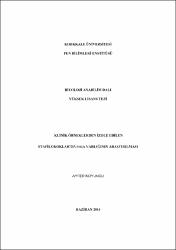Klinik örneklerden izole edilen stafilokoklar'da mecA varlığının araştırılması
Özet
Bu çalışmanın amacı, çeşitli klinik örneklerden izole edilen 102 adet stafilokok suşunun, biyokimyasal tanımlanması, çoklu direnç probleminin en çok yaşandığı metisilin dirençli Staphylococcus aureus (MRSA) suşlarının alternatif antibiyotiklere direnç oranlarının saptanması ve genetiksel olarak mecA varlığının araştırılması esasına dayanmaktadır. S. aureus geniş bir spektrumda enfeksiyonlara neden olan, özellikle metisiline dirençli suşları ile ciddi hastane enfeksiyonları oluşturan bir etkendir. Uzun süreli antibiyotik kullanımı direnç gelişimi için önemli olup bu direnci (metisilin ve diğer beta-laktam antibiyotiklere) mecA geni oluşturur. Tedavisi oldukça zor ve maliyetlidir. Bu yüzden S. aureus (MRSA) suşlarının doğru tanısı çok önemlidir. Bu çalışmada çeşitli klinik örneklerden izole edilen stafilokok suşlarının tanımlanması konvansiyonel yöntemler ve VITEK 2 (bioMerieux, St. Louis, ABD) otomatik tanımlama sistemi kullanılarak yapılmıştır. Antibiyotik duyarlılıkları Clinical and Laboratory Standards Institute (CLSI) önerileri doğrultusunda Kirby-Bauer disk difüzyon yöntemi kullanılarak belirlenmiştir. Suşların 75'i (% 73,5) metisiline dirençli (71 adet MRSA ve 4 adet MR-KNS), 27'si (% 26,5) metisiline duyarlı (3 adet MSSA, 3 adet MRSA ve 21 adet KNS) olarak tespit edilmiştir. Bütün stafilokok suşları vankomisine duyarlı olarak saptanmıştır. Stafilokoklarda heterojen dirençli suşlar nedeniyle metisilin direncinin fenotipik yöntemlerle gösterilmesi sıklıkla yanlışlıklara neden olduğundan S. aureus izolatlarında metisilin direncinin gösterilmesinde en uygun yöntem polimeraz zincir reaksiyonu (PZR) ile mecA gen varlığının belirlenmesidir. Bu amaçla, disk difüzyon yöntemi ile metisiline dirençli veya metisiline duyarlı olduğu belirlenen 102 adet stafilokok suşlarında DNA ekstraksiyonu yapılmış, PZR yöntemiyle mecA geni araştırılmıştır. Disk difüzyon yöntemiyle metisiline dirençli olarak saptanan 75 adet suşun hepsi dirençli olarak saptanmış olup PZR yöntemiyle mecA geni içerip içermediği araştırılmış ve yapılan işlemler sonucu mecA pozitif olduğu bulunmuştur. Aynı şekilde disk difüzyon yöntemiyle metisiline duyarlı çıkan 16AC, 18AC ve 9AE kodlu izolatların ise metisilin direnç geni içerdiği PZR yöntemiyle tespit edilmiştir. Sonuç olarak bu çalışma bize metisilin direncinin tespitinde disk difüzyon tekniğinin moleküler yöntemler ile desteklenmesi gerektiğini göstermektedir. The aim of this thesis is to provide biochemical definition of 102 staphylococci strains that were isolated from some clinics, and the ratio of resistance between multi-resistant staphylococcus aureus (MRSA) strains and alternative antibiotics. In thesis, we discuss the existence of mecA based on genetical investigations. In a broad specrtrum, S.aureus causes infections, especially when it is with methicillin-resistant strains from hospital infections. Long-terms use of antibiotics that are important for the development of resistance (methicillin and other beta-lactam antibiotic) creates the mecA gene. Thus it is very imperative that MRSA strains can be diagnoised accurately. In this thesis, we study the identification of staphylococci, by using conventional methods and VITEX 2 (bioMerieux, St.Louis, USA) automatic identification system. We used CLSI (Clinical and Laboratory Standarts Institute) standards and Kirby-Bauer disc diffusion method to determine the sentitivity of antibiotics. It was found that 27 of strains (26,5 %) were methicillin-sensitive (MSSA) and 75 of strains (73,5 %) were methicillin-resistant. All staphylococci strains were found to be sensitive to vancomycin. Because staphylococci contains heterogeneously resistant strains, it can be misleading showing the resistance of methicillin by phenotypic methods. The most appropriate method for determining the resistance of S. aureus to methicillin is polymorre chain reaction along with mecA gene. For this purpose, the DNA extraction of 102 staphylococci strains, wich are know to be methicillin-resistant and sensitive by disc diffusion method, were made, and the mecA gene were investigated by PZR method. All 75 staphylococci methicillin-resistant strains, which is know by disc diffusion method, were discovered to be resistant and further investigations were done on whether all 75 staphylococci contain mecA gene or not and positive results were obtained as a result. Similarly, The methicillin-resistant 16AC, 18AC and 9AE which are known to be sensitive by disc diffusion method, codes were discovered to contain gene-resistance by using polimerase chain reaction (PZR) method.
















